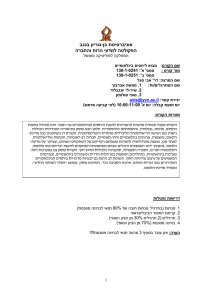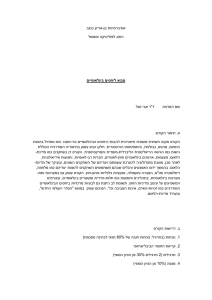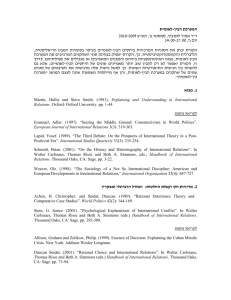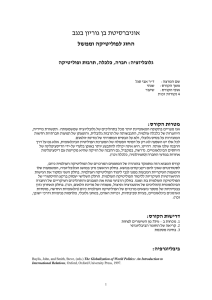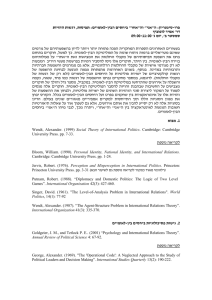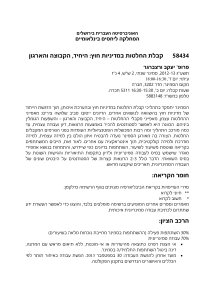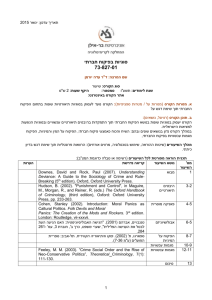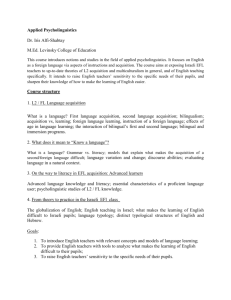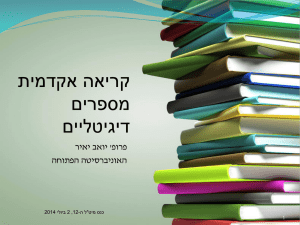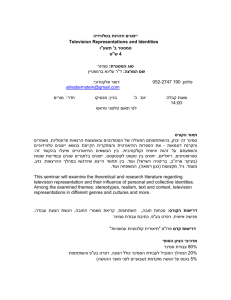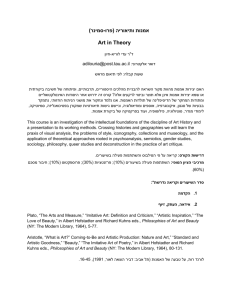לצפייה בסילבוס נא ללחוץ כאן
advertisement
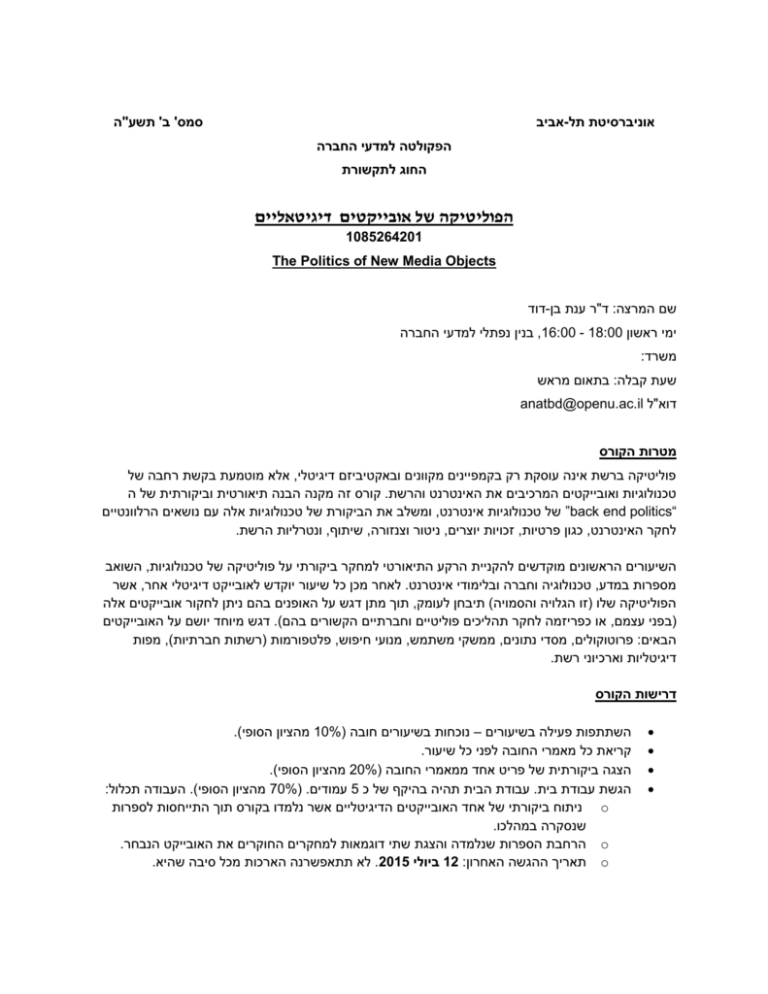
סמס' ב' תשע"ה אוניברסיטת תל-אביב הפקולטה למדעי החברה החוג לתקשורת הפוליטיקה של אובייקטים דיגיטאליים 1085264201 The Politics of New Media Objects שם המרצה :ד"ר ענת בן-דוד ימי ראשון ,16::: - 18:::בנין נפתלי למדעי החברה משרד: שעת קבלה :בתאום מראש דוא"ל anatbd@openu.ac.il מטרות הקורס פוליטיקה ברשת אינה עוסקת רק בקמפיינים מקוונים ובאקטיביזם דיגיטלי ,אלא מוטמעת בקשת רחבה של טכנולוגיות ואובייקטים המרכיבים את האינטרנט והרשת .קורס זה מקנה הבנה תיאורטית וביקורתית של ה “ ”back end politicsשל טכנולוגיות אינטרנט ,ומשלב את הביקורת של טכנולוגיות אלה עם נושאים הרלוונטיים לחקר האינטרנט ,כגון פרטיות ,זכויות יוצרים ,ניטור וצנזורה ,שיתוף ,ונטרליות הרשת. השיעורים הראשונים מוקדשים להקניית הרקע התיאורטי למחקר ביקורתי על פוליטיקה של טכנולוגיות ,השואב מספרות במדע ,טכנולוגיה וחברה ובלימודי אינטרנט .לאחר מכן כל שיעור יוקדש לאובייקט דיגיטלי אחר ,אשר הפוליטיקה שלו (זו הגלויה והסמויה) תיבחן לעומק ,תוך מתן דגש על האופנים בהם ניתן לחקור אובייקטים אלה (בפני עצמם ,או כפריזמה לחקר תהליכים פוליטיים וחברתיים הקשורים בהם) .דגש מיוחד יושם על האובייקטים הבאים :פרוטוקולים ,מסדי נתונים ,ממשקי משתמש ,מנועי חיפוש ,פלטפורמות (רשתות חברתיות) ,מפות דיגיטליות וארכיוני רשת. דרישות הקורס השתתפות פעילה בשיעורים – נוכחות בשיעורים חובה ( 1:%מהציון הסופי). קריאת כל מאמרי החובה לפני כל שיעור. הצגה ביקורתית של פריט אחד ממאמרי החובה ( 0:%מהציון הסופי). הגשת עבודת בית .עבודת הבית תהיה בהיקף של כ 5עמודים 0:%( .מהציון הסופי) .העבודה תכלול: oניתוח ביקורתי של אחד האובייקטים הדיגיטליים אשר נלמדו בקורס תוך התייחסות לספרות שנסקרה במהלכו. oהרחבת הספרות שנלמדה והצגת שתי דוגמאות למחקרים החוקרים את האובייקט הנבחר. oתאריך ההגשה האחרון 12 :ביולי .2015לא תתאפשרנה הארכות מכל סיבה שהיא. תכנית הקורס מבוא – האינטרנט בין אוטופיה לדיסטופיה.1 Thierer, A. 2011. “The Case for Internet Optimism, Part 1-Saving the Net from Its Detractors.” in Szoka, B., & Marcus, A. (Eds.) The Next Digital Decade: Essays on the Future of the Internet, pp. 57-88. Thierer, A. 2011. “The Case for Internet Optimism, Part 2-Saving the Net from Its supporters.” in Szoka, B., & Marcus, A. (Eds.) The Next Digital Decade: Essays on the Future of the Internet, pp. 139-162. Morozov, E. 2011. "Can the Net Liberate the World?" in Szoka, B., & Marcus, A. (Eds.) The Next Digital Decade: Essays on the Future of the Internet, pp. 557-564. ופוליטיקה של מידע וידע,אנושיים- האם לעצמים יש פוליטיקה? סוכנים אנושיים ולא.0 Winner, L. 1980. “Do Artifacts Have Politics?” Daedalus, Vol. 109, No. 1, Modern Technology: Problem or Opportunity? (Winter), pp. 121-136. Latour, B. 1992. “Where are the Missing Masses? The Sociology of a Few Mundane Artifacts”. In Bijker W. and Law, J. (Eds). Shaping Technology/Building Society: Studies in Sociotechnical Change. The MIT Press: 225:258. Rogers, R. 2004. "Introduction: Behind the Practice of Information Politics". In Information Politics on the Web. MIT Press, pp. 1-30. פוליטיקה של תשתיות וההיסטוריה של האינטרנט.3 Bowker, G., Baker K., Milerand,F., and David Ribes. 2009. "Towards Information Infrastructure Studies: Ways of Knowing in a Networked Environment. In The International Handbook of Internet Research., edited by J. Hunsunger, M. Allen, and L. Klasrup. Springer Verlag. Sterling, B. 1993. Short History of the Internet. Internet Society. פרוטוקולים.4 Galloway, A. 2006. Protocol, or, How Control Exists After Decentralization. The MIT Press. (Chapters One and Two). DeNardis, L. 2012. “Hidden Levers of Internet Control: An Infrastructure-Based Theory of Internet Governance”. Information, Communication & Society, 15(5), 720-738. Segal, B. (1995). A short history of Internet protocols at CERN. CERN Website, April. Lessig, L. (1999). Code is law. The Industry Standard, 18. Website ממשל האינטרנט וצנזורה.5 Mueller, M. 2004. Ruling the Root: Internet Governance and the Taming of Cyberspace. The MIT Press. Chapter One. Goldsmith, J., and T. Wu. 2007. Who Controls the Internet? Illusions of a Borderless World. Oxford University Press. Chapter 5. How Governments Rule the Net. PP. 65-86. Faris, R. and Villeneuve,N. 2008. Measuring Global Internet Filtering. In Deibert, R. (Ed). Access Denied: The Practice and Policy of Global Internet Filtering. The MIT Press. . קוד סגור וזכויות יוצרים, קוד פתוח.6 Lessig, L. 2006. Code 2.0, Chapters One and Two. Maurer, S. M., & Scotchmer, S. 2006. Open source software: the new intellectual property paradigm (No. w12148). National Bureau of Economic Research. PDF Gillespie, T. (n.d). Digital Rights Management, Trusted Computing, and the Institutions Who Love Them. ממשקים וגנים סגורים.0 Manovich, L. 2002. “The Interface”, in The Language of New Media. The MIT press. pp. 75-94 Gillespie, T. 2010. “The Politics of ‘platforms’.” New Media & Society 12 (3): 347-367. וחרקי רשת אחריםCookies, bots .8 Bays, H., and M. Mowbray. 1999. “Cookies, Gift-giving, and the Internet.” First Monday 4 (11). http://frodo.lib.uic.edu/ojsjournals/index.php/fm/article/view/700. Geiger, R. S. 2009. “The Social Roles of Bots and Assisted Editing Programs.” In Proceedings of the 5th International Symposium on Wikis and Open Collaboration, 30. Bennett, C. J. 2001. “Cookies, Web Bugs, Webcams and Cue Cats: Patterns of Surveillance on the World Wide Web.” Ethics and Information Technology 3 (3): 195–208. נתונים- מסדי.9 Manovich, L. 1999. “Database as symbolic form”, Convergence 5 (2): 172–192. Bowker, G. C. 2007. “The Past and the Internet.” In Structures of Participation in Digital Culture, ed. Joe Karaganis. New York: Social Science Research Council: 20–36. Poster, M. 1996. “Databases as Discourse; or, Electronic Interpellations Mark Poster.” In Lyon, David, and Elia Zureik. (Eds.) Computers, Surveillance, and Privacy. University of Minnesota Press: 175- 192. קישורים.1: Rogers, R. 2004. Information Politics on the Web. The MIT Press. Chapter Six. Elmer, G. 2006. “Re-tooling the Network Parsing the Links and Codes of the Web World.” Convergence: The International Journal of Research into New Media Technologies 12 (1): 9– 19. Park, H. W., and M. Thelwall. 2003. “Hyperlink Analyses of the World Wide Web: A Review.” Journal of Computer-Mediated Communication 8 (4): http://jcmc.indiana.edu/vol8/issue4/park.html אלגוריתמים ממליצים ומנועי חיפוש.11 Introna, L. D., and H. Nissenbaum. 2000. “Shaping the Web: Why the Politics of Search Engines Matters.” The Information Society 16 (3): 169–185. Grimmelmann J. 2009. The Google Dilemma, 53 New York Law School Law Review 939. Rogers, Richard. 2013. Googlization and the Inculpable Engine, Chapter 4 in Digital methods (pp. 83-93). Cambridge, Massachusetts: MIT. ארכיונים.10 Wolfgang, E. 2006. "Dis/continuities: Does the Archive Become Metaphorical in Multi-Media Space?" New Media, Old Media: 105-123. Chun, W. H. K. 2008. “The Enduring Ephemeral, or the Future Is a Memory.” Critical Inquiry 35 (1): 148–171. מפות.13 Abrams, J., P. Hall, and University of Minnesota Design Institute. 2006. Else/where–mapping: New Cartographies of Networks and Territories. University of Minnesota Design Institute. Dodge, M. 1999. “The Geographies of Cyberspace.” Farman, J. 2010. “Mapping the Digital Empire: Google Earth and the Process of Postmodern Cartography.” New Media & Society 12 (6): 869–888.
